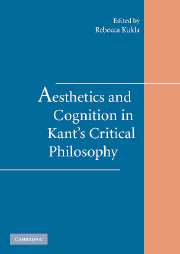Book contents
- Frontmatter
- Contents
- Notes on Contributors
- Acknowledgments
- 1 Introduction: Placing the Aesthetic in Kant's Critical Epistemology
- PART I SENSIBLE PARTICULARS AND DISCURSIVE JUDGMENT
- PART II THE COGNITIVE STRUCTURE OF AESTHETIC JUDGMENT
- PART III CREATIVITY, COMMUNITY, AND REFLECTIVE JUDGMENT
- 9 Reflection, Reflective Judgment, and Aesthetic Exemplarity
- 10 Understanding Aestheticized
- 11 Unearthing the Wonder: A “Post-Kantian” Paradigm in Kant's Critique of Judgment
- Bibliography
- Index
10 - Understanding Aestheticized
Published online by Cambridge University Press: 24 July 2009
- Frontmatter
- Contents
- Notes on Contributors
- Acknowledgments
- 1 Introduction: Placing the Aesthetic in Kant's Critical Epistemology
- PART I SENSIBLE PARTICULARS AND DISCURSIVE JUDGMENT
- PART II THE COGNITIVE STRUCTURE OF AESTHETIC JUDGMENT
- PART III CREATIVITY, COMMUNITY, AND REFLECTIVE JUDGMENT
- 9 Reflection, Reflective Judgment, and Aesthetic Exemplarity
- 10 Understanding Aestheticized
- 11 Unearthing the Wonder: A “Post-Kantian” Paradigm in Kant's Critique of Judgment
- Bibliography
- Index
Summary
Many interpretations of Kant's first and third Critiques tend to treat these texts as at best tangentially related. Kant's distinction between determinative and reflective judgment – the former largely the purview of the Critique of Pure Reason's Transcendental Analytic, the latter the subject of the Critique of the Power of Judgment – invites a view of these mental acts as wholly distinct. Determination, after all, involves the subsumption of objects under concepts, while the reflective judgments of the third Critique appear to involve no determining concepts. Pure aesthetic judgments especially seem irrelevant to our conceptualizing efforts, for their basis lies in a certain kind of pleasure rather than in cognition. A healthy corrective to this tendency is provided by Beatrice Longuenesse in her Kant and the Capacity to Judge (1998). Longuenesse makes a compelling case that reflection plays a role in empirical concept formation in all our acts of judging particulars determinatively. She argues that the “concepts of reflection” of the first Critique Amphiboly guide the generation of empirical concepts through the application of the logical forms of judgment to particulars. Reflecting on the particular to produce a universal under which to subsume it is then one aspect of determinative cognition. Even the categorial structure of experience, Longuenesse argues, is the outcome of acts of judgment with a fundamentally reflective origin.
- Type
- Chapter
- Information
- Aesthetics and Cognition in Kant's Critical Philosophy , pp. 245 - 265Publisher: Cambridge University PressPrint publication year: 2006
- 1
- Cited by

